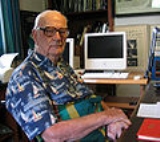
(16 December 1917 – 19 March 2008) was a British
science fiction
author, inventor, and futurist, famous for his short stories and novels, among them 2001: A Space Odyssey
, and as a host and commentator in the British television series Mysterious World
. For many years, Robert A. Heinlein
, Isaac Asimov
, and Arthur C. Clarke were known as the "Big Three" of science fiction.
Clarke served in the Royal Air Force
as a radar
instructor and technician from 1941–1946.
If we have learned one thing from the history of invention and discovery, it is that, in the long run — and often in the short one — the most daring prophecies seem laughably conservative.![]()
It is not easy to see how the more extreme forms of nationalism can long survive when men have seen the Earth in its true perspective as a single small globe against the stars.![]()
We stand now at the turning point between two eras. Behind us is a past to which we can never return ... The coming of the rocket brought to an end a million years of isolation ... the childhood of our race was over and history as we know it began.![]()
All explorers are seeking something they have lost. It is seldom that they find it, and more seldom still that the attainment brings them greater happiness than the quest.![]()
Science can destroy religion by ignoring it as well as by disproving its tenets. No one ever demonstrated, so far as I am aware, the non-existence of Zeus or Thor — but they have few followers now.![]()
They will have time enough, in those endless aeons, to attempt all things, and to gather all knowledge ... no Gods imagined by our minds have ever possessed the powers they will command ... But for all that, they may envy us, basking in the bright afterglow of Creation; for we knew the Universe when it was young.![]()
Yet now, as he roared across the night sky toward and unknown destiny, he found himself facing that bleak and ultimate question which so few men can answer to their satisfaction. What have I done with my life, he asked himself, that the world will be poorer if I leave it.![]()
Human judges can show mercy. But against the laws of nature, there is no appeal.![]()
As our own species is in the process of proving, one cannot have superior science and inferior morals. The combination is unstable and self-destroying.![]()

